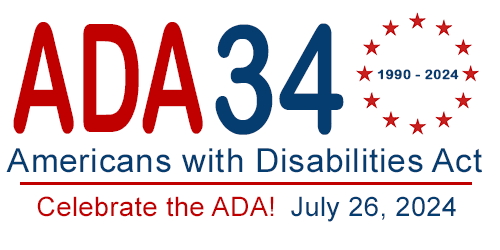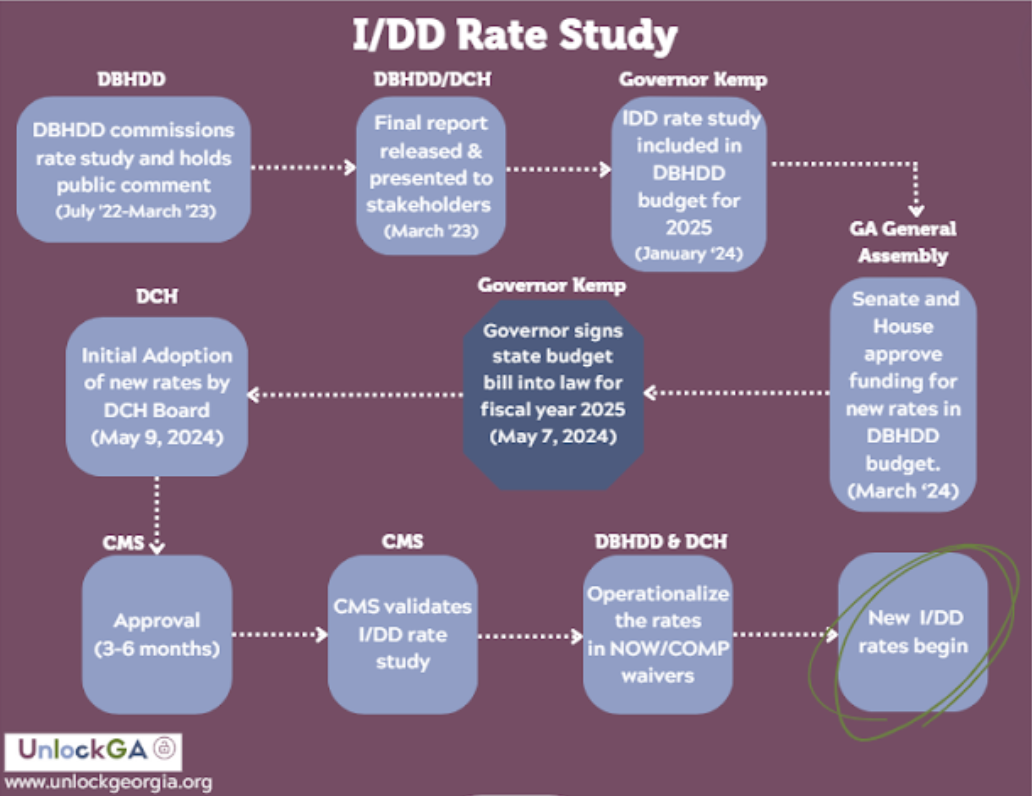GCDD e-news - September 2024

A Digital Newsletter from the Georgia Council on Developmental Disabilities • September 2024
The Georgia Council on Developmental Disabilities newsletter keeps you up-to-date on the latest news, from what’s happening with public policy in Georgia to updates on current issues affecting Georgians with developmental disabilities to upcoming events.
In This Issue:
- Message from GCDD Executive Director
- Public Policy for the People: Get out the vote!
- Georgians Celebrate ADA's 34th Anniversary
- Georgia's Direct Support Professionals to Get Rate Increase
- Calendar Spotlight
Message from GCDD Executive Director: Your Vote Counts!

No matter what I did, I could not escape the sign.
There it stood, day in and day out, staring me in the face with its primary colors and simple block lettering. It might as well have been blinking neon – the election! The election! The election is coming, and you might lose!
Well, not me. My dad.
I was six years old, my dad was running for mayor of my city, and the house across the street from my elementary school had a sign in the yard for my dad’s opponent.
I don’t even remember the opponent’s name (my mom probably does). But I remember all too well the feeling of anxiety that I felt every morning when I got to school and every afternoon when I left. And, even worse, the feeling that there was nothing I could do.
But that was a long time ago. Now, there’s plenty that I can do. And as you are reading this, know that there is plenty that you can do today too. As we are headed into another voting season, know that every single person on the ballot is asking to make decisions that will impact your life and the lives of the people you love.
The Georgia Council on Developmental Disabilities’ (GCDD) e-newsletter is published each quarter during the calendar year. This Fall/September issue is the perfect reminder to you that now is the perfect time to check your voter’s registration as elections are underway. You can do this by visiting GA My Voter Page. It only takes a few seconds to click and make sure your registration is still current, and that you know where your polling place is (sometimes they change). If anything looks incorrect with your registration – or you are not registered at all – you still have time to act.
First, make a plan to vote. Are you voting early? Find out the times, dates and locations where you can go. Do you want to vote absentee? Request your ballot now at Voter Registration (ga.gov). Do you plan to vote on election day itself? Act now and schedule that time to vote on your calendar as soon as possible. Do not wait. Plan for any logistics you need, in case you need someone to accompany you or you need a ride to the polls. I think of it like an important appointment – you get to decide when, but if you do not prioritize, you may miss out.
When it comes to who to vote for – again, you have time to do your research. I find it is helpful to look at a copy of a ballot before I go to vote to see the list of the races. Many local media publications publish voter guides, which can be a good place to get information. Remember, candidates have their own websites where you can get information about their campaigns. Additionally, town halls are another source of information regarding candidates during elections. You are allowed to bring a written list of who you want to vote for into the polls. The list however, cannot be on your cell phone.
Next, have a plan even if you do not like any of the candidates running in a race. You do have the option to write in someone else’s name on the ballot. You may have to pick who you consider to be the better out of choices you are not excited about.
Maybe the next time, you’ll recruit someone you believe in to run for office. Or maybe, you will go for it yourself.
No matter what you do, the goal is to not make the mistake of treating democracy like a spectator sport. Be active in it because your voice matters and can help to make a difference.
In the words of legendary disability advocate Justin Dart, vote like your life depends on it, because it does.
D’Arcy Robb
Executive Director, GCDD

Public Policy for the People: Get out the vote!
by Charlie Miller
Hello Advocates! How in the world are you doing today?
We are coming to you with the latest and greatest public policy update for the people in the Georgia Council on Developmental Disabilities’ (GCDD) e-newsletter.
We are officially counting down the days until the November election. With our state House and Senate seats, and our Presidential election upon us, this election is crucial.
It is important not only to be educated on who you're voting for but also how to plan to vote. This article will explain how you can make sure your voter registration is up to date and to ensure you know where your local polling station is located.
Make a Plan
When we think about voting in Georgia a lot of people think about going to the polls and that is it. However there is so much more involved than just going to the polls. It is important that people plan ahead to make sure they are prepared to vote by checking their voter registration in advance. They can do that on the Georgia elections website at https://mvp.sos.ga.gov/s/
Once people visit this website, all they have to do is put their first initial, last name, county, and date of birth. If they are an active voter, it will show under the status column “active.” If they are not an active voter, it will give them the option to update their voter registration.
Please keep in mind that the online and in person registration deadline is Monday October 7, 2024. If you are completing your registration and plan to mail it in, it must be postmarked by October 7, 2024.
Now that we are up to date with your registration, it is important to make sure we are looking at the candidates and understanding where they sit on disability issues.
You can do that by searching on campaign websites or reaching out to a campaign office. If you reach out to them or their office, make sure they know you are a voter in their district. Candidates really want to listen to the voters in the communities they represent.
 It’s time to vote
It’s time to vote
When you are ready to cast your vote, there are several different ways to make sure it is received and counted.
If you're interested in voting by mail, the 2024 absentee ballot request option is currently open. If you are requesting the absentee ballot online, it needs to be submitted by October 25, 2024. If you are submitting it through the mail you will need to contact your local county elections office which is included on your voter registration information.
The Georgia Secretary of State's website gives you a step-by-step guide on how to register to vote, submit your application, and where to vote.
During this election season, the state of Georgia is getting a lot of national attention. We are considered a highly valuable state in the federal elections. More recently, you may have noticed an increase in TV and news advertisements for candidates and candidates visiting communities throughout the state more regularly.
This presents a great opportunity for the disability community’s voice to be heard on a national level. Keep an eye out for an upcoming Disability Voter Registration Week and other voting initiatives we have with partners throughout the state.
In the words of the father of the American Disabilities Act (ADA), Justin Dart, “Vote as if your life depends on it, because it does.”

Georgians Celebrate ADA's 34th Anniversary

Georgia’s disability community gathered on July 26, 2024 at Friendship Baptist Church, located in downtown Atlanta, Georgia to celebrate the 34th anniversary of the Americans Disabilities Act (ADA). The ADA was signed into law on July 26, 1990, transforming the landscape of rights and accessibility for people with disabilities.
The celebration, called the ADA Anniversary Celebration Rally, was hosted by SHOWAbility, a human services organization that leverages the performing arts as a platform for talented individuals with disabilities.
The 4th annual ADA Celebration rally drew approximately 200 participants. The day was emceed by Yvette Peques, a well known disability advocate in Georgia. Peques is an award-winning executive and founder of Your Invisible Disability Group, an organization that intentionally educates, empowers, equips, and includes individuals with disabilities. She led the show which highlighted leaders in advocacy and education. The celebration brought together various organizations across the state that work with and advocate on behalf of people with developmental disabilities and their families.
ADA and Digital Media/Technology
While the ADA has been successful in creating physical accommodations, many advocates now ask: Is the ADA going to cover digital media and technology? The event focused on how the ADA’s original mandate of accommodations translates to today’s technology driven world. The panel featured technology professionals with disabilities who spoke about communications and the need for accessible products, and how artificial intelligence and machine learning can help build a more inclusive world.
The panel included:
- Madison Russell, Digital Accessibility Specialist at Elsevier, an academic publishing company. Russell, who uses a wheelchair, is a disability advocate and accessibility specialist in human computing and digital accessibility. She is also the President of Advocacy at the United Spinal Association of Georgia.
- Brandon Biggs, CEO of XR Navigation, and a PhD student at Georgia Tech on human centered computing. Biggs, who is blind and visually impaired, focused on human centered inclusive design principles.
- Trey Quinn is a recent alumnus of the College of Computing at Georgia Tech.
During the panel discussion, the guests spoke about being in the community and focusing on building their careers around accessibility and design. The big question was: Why is accessible design becoming important?
“People with disabilities are very loyal with their money,” said Russell. She gave an example of Aerie, a clothing company that is now producing adaptive clothing and featuring people with disabilities in marketing. Biggs noted that Apple is more accessible to the blind community. When companies include people with disabilities, they will more than likely share that company’s product information with others.
Biggs added about the importance of inclusive testing. “So when companies make products, include people with disabilities in the testing phase of your products so it’s truly accessible,” added Biggs.
Peques, who moderated the panel, asked how to advocate and support policy to improve digital accessibility.
The panelists suggested simple tactics like contacting website owners about accessibility issues with their website or mobile app. Another tactic is to keep standing up for accessibility and having allies to also advocate for a more inclusive digital world.
Quinn encouraged people to push for public policy. “With advocacy and policy, it’s a combination for driving digital accessibility forward,” he said.
The event featured a performance by the SHOWAbility Inclusive Chorus which revved up the crowd with songs such as “Happy” by Pharell Williams. Dwight Calhoun, also known as Mr. Cardio Tone, led the crowd in fun group chair exercises, and more. Other performances included a small orchestra of youth who are diagnosed with autism.
“The ADA Anniversary Celebration Rally is not just a commemorative event, but a crucial platform for highlighting and educating about advancements and ongoing challenges in disability rights,” said Myrna Clayton, founder and executive director of SHOWAbility.
The event was presented by Amazon, and included sponsors such as MARTA, the Georgia Council on Developmental Disabilities (GCDD), and Disability:IN Greater Atlanta.

Georgia's Direct Support Professionals to Get Rate Increase
by Charlotte Densmore, GCDD Public Policy Director
One of the most exciting outcomes of the 2024 legislative session was the allocation of $79 million in the state budget for the increase of direct support professional (DSP) wages in Georgia. DSPs play an integral role in the life of people with disabilities by providing essential assistance with daily living, personal care, and community integration. The rate that DSPs are paid (how much money per hour) is set by the state through Medicare. There is a long process for changing that amount as a result.
As of August 2024, Georgia is making significant progress in addressing the wage issues faced by DSPs, but the full implementation of the rate increase remains a work in progress. Here’s an update on where the issue stands and the factors that influence the timeline.
Legislative Support and Funding Approval
The Georgia legislature has approved $108 million in funding to increase DSP salaries: $79 million came from the state budget and $29 million came from federal American Rescue Plan Act (ARPA) funding. This money represents a substantial commitment to improving the compensation of DSPs. However, while this legislative support is a crucial step, the increase in wages has not yet reached down to the DSPs where they can see the difference.
Recent Developments: Waiver Amendments and Rate Increases
A significant recent development regarding Medicaid waivers and the rate increase is the approval of amendments to the New Options Waiver (NOW) and Comprehensive Supports (COMP) waivers by the Centers for Medicare and Medicaid Services (CMS) on July 11, 2024. This approval allows the Georgia Department of Behavioral Health and Developmental Disabilities (DBHDD) to actually provide the historic Medicaid provider rate increases, which will benefit DSPs directly.
The rate increases began retroactively July 1, 2024, ensuring that DSPs receive the benefits from the beginning of this fiscal year. The work to actualize these amendments and incorporate the increased rates into provider payments is currently underway. While this is a positive development, it is important to note that the implementation process can take time.
Current Challenges and Reasons for Delay
- Administrative and Implementation Processes: Even with the funding and waiver amendments approved, several administrative steps must be completed before DSPs see the increased wages. This includes adjusting contracts, updating payroll systems, and compliance and reporting.
- Negotiations with Service Providers: Providers must adapt their budgets and financial planning to align with the new rate structures. This negotiation process can be lengthy, impacting the speed at which wage increases are distributed.
- Bureaucratic Delays: The allocation and distribution of funds includes various state departments and agencies, and bureaucratic delays can impact the timing of wage adjustments.
Looking Ahead
The approval of the NOW and COMP waiver amendments and the $108 million in funding are significant steps towards improving DSP compensation in Georgia and now the state has legislation that requires a review of DSP rates every four years. With this in place, advocates can anticipate that DSP rates will increase again in 2027 or 2028.
More information about the specifics of the implementation process will be forthcoming as DBHDD continues to finalize the details. GCDD is also working with its DD Network partners to continue advocacy and oversight, which will be crucial in ensuring that these important changes are executed effectively, and that DSPs receive the fair compensation they deserve.
Advocates can be proud that the state of Georgia is progressing towards enhancing DSP wages, even though the path from legislative approval and waiver amendments to actual wage increases involves a series of complex steps and can potentially take longer than expected.
In the graphic below, we are currently at the ‘DBHDD/DCH operationalize the rates’ stage.


Calendar Spotlight Fall 2024
Parent2Parent: Movin' Up! Planning Your Child’s Successful Transition at Age 3
- September 5, 2024 from 12:00PM to 1:00PM (virtual training)
- Join P2P as they discuss how to prepare and plan for a smooth transition from Babies Can’t Wait/early intervention. The presentation includes an overview of various programs and services that may be available for three-year-olds with special needs in your community.
- For more information, click here.
Uniting for Change: Community Strong
- September 9, 2024, from 4:00 PM to 5:00 PM via Zoom
- Community Strong, led by self-advocates for self-advocates, is a weekly Zoom gathering about having fun and spending time with each other!
- Register here
Uniting for Change: North Georgia Area Network Meeting - Demorest
- September 10, 2024 beginning at 10:00AM.
- Register here
Uniting for Change: Metro ATL Area Network Meeting - Tucker
- September 20,2024 from 10:00AM-12:00PM
- Register here
Uniting for Change: Our Voice Our Vote Part 1: The Foundations of Voting
- September 24, 2024 from 10:00AM to 12:00PM via Zoom
- Hear from Uniting for Change self-advocates about the importance of voting - why it matters - and what you need to know to register and vote in 2024!
- Register here
Seventh Annual Georgia History Disability Symposium
October 1, 2024 in Athens, Georgia from 9:00AM to 5:00PM
The Richard B. Russell Library in collaboration with the University of Georgia’s Institute on Human Development and Disability (IHDD) and the Georgia Disability History Alliance (GDHA) presents the 7th annual Georgia History Disability Symposium.
Home Grown, World Class: Georgia's Contributions to the Movement. The 2024 guest speaker is Charlotte McClain-Nhlapo, Global Disability Advisor at the World Bank Group. This will be a hybrid event with both in-person and virtual participation. To learn more about the symposium, visit the event website.
To register:
- Register here to attend in person (seating is limited to participate in-person)
- Register to attend virtually
Down Syndrome Association of Atlanta: The Buddy Walk
- October 5, 2024, from 10:00AM to 2:05PM at Kennesaw State University, Marietta Campus, 1100 South Marietta Parkway SE, Marietta, GA, 30060
- Register here